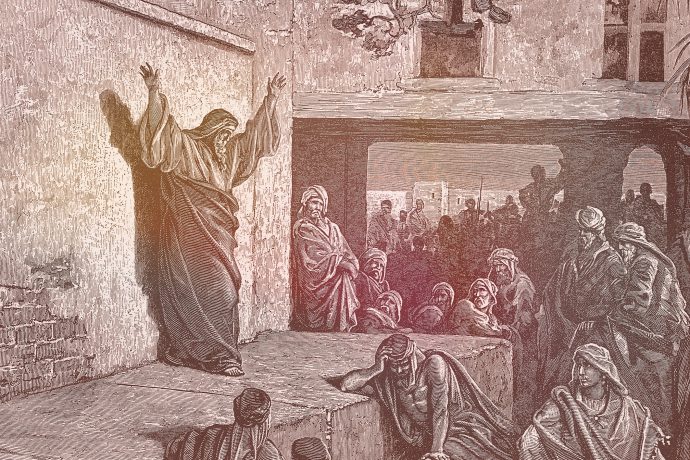Last night in the debate, Hillary Clinton once again alluded to one of the most common, long-standing criticisms of Donald Trump’s character: his inability to apologize.
But if the GOP candidate repented of his various insults (and now, apparently, abuses) would we would even care?
By now the ritual is familiar to us. A public figure gets up in front of the cameras to offer an apology (as Trump indeed did, more or less). And then the questioning begins. Was the apology “genuine?” Were the words “heartfelt?” But, in the case of Mr. Trump, as well as the others, what would a “sincere” apology even look like?
Apologies are by their very nature short—and often scripted. That we continuously question their legitimacy might not really have to do with the sincerity of their performance. The problem might not just be with Trump, in other words—it might have to do with the nature of repentance itself.
We think of repentance as an obvious, natural, and inevitable component of our lives, an inherent, universal moral good. But in fact, it is the product of a particular time and place. Repentance first arose as a concept around within early forms of Judaism and Christianity (around the turn of the Common Era) as a means of enabling those who lapsed within the religious community to remain within its ranks, as well as for those outside of it to enter the community with relative ease.
The concept of repentance eventually blossomed into a core component of an introspective spirituality nurtured by medieval Jews, Christians, and Muslims alike. Today, as inheritors of these traditions, we are taught to believe, in both religious and secular contexts, in the power and importance of apology. But does repentance work in a political sphere as fractured as our own? The absurd back-and-forth demands for apology in this year’s election and our own skeptical reactions suggest otherwise.
One of the biggest problems with repentance is that it leaves power in the hands of the victimizer, rather than the victim. The offenders—their feelings, their thoughts, their actions—remain center stage. They control the narrative. When will they choose to apologize? How do they feel about what they’ve done? In what ways will it transform them for the better? Focusing on repentance can end up enabling a continuation of the very privilege that is often the basis of the most heinous of crimes.
Trump’s apology for his repellent banter with Billy Bush in 2005—delivered, as it was, in Trump Tower with the New York City skyline behind him—could hardly be expected to be effective.
Finding alternatives to dominant forms of moral language can be difficult precisely because such important concepts as repentance tend to become the lens through which we view all available modes of reconciliation. In my recent book on this topic, How Repentance Became Biblical, I show how early Jewish and Christian readers of the Bible claim that their concept of repentance is grounded, in fact, in the ancient Hebrew texts themselves. But when we go back and reread these same texts with an awareness of our interpretive bias, we are able to uncover new, challenging possibilities for action, alternatives to our present assumptions.
What emerges with particular clarity in the corpus of texts known as the Hebrew Bible or Old Testament is the primacy of the voices of the victims. Woe to those who would oppress the widows or the orphans. Their pleas will be heard immediately, so it says in Exodus. This principle is understood quite well in the Psalms, which never tire of emphasizing the dire situation of the petitioner. Most striking are the cases of kings who abuse their power, figures such as David and Ahab. They must come down from their thrones, remove their royal garb, don sackcloth and ashes, and, often, fast. The point of this exercise is not to express contrition but to adopt a new persona, one that reflects the actual state of diminishment they have brought upon themselves. They must cease, essentially, being kings, then, perhaps, they can be heard from again.
Similarly, with the formula for confession in the Bible, “I have sinned against you,” the point is not to apologize, to express regret. Rather, confession constitutes a legal act whereby the victimizer is placed into the hands of the victim. Such a declaration directly empowers the victim to impose a penalty upon the victimizer and, thereby, become a subject in the narrative.
Biblical realities are not our own, of course. But I’d argue that a consideration of ancient, often, repressed possibilities frees us to think in new ways about the present.
Perhaps, the voices of those who have been brought low are really the ones we want to hear, as Kelly Oxford understood so clearly in her extraordinary call to action: “Women: tweet me your first assaults.” Scrutinizing the Trump tape or his response to it in an attempt to discern the inner state of his soul may be counterproductive in a society like ours, where such abuses continue unabated.
Jews around the world recently celebrated Yom Kippur (the “Day of Atonement”), a day of personal reflection and repentance. In its biblical context, however, its meaning is quite different: it is a day to reflect bodily through fasting and other practices of mourning the dire state of the temple sanctuary or, in our case, the state of society and the world as a whole that our transgressions have brought about.
We would do well today to find ways to reflect such diminishment, the voices of the victims, and take a step back from our obsessive interest in the inner life of those who abuse their power. They are likely to remain irredeemable as long as they remain entrenched within it.


